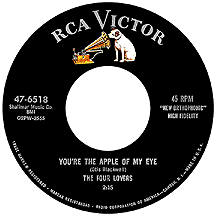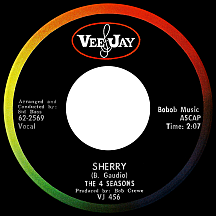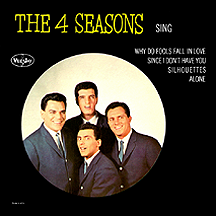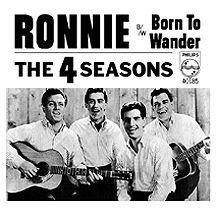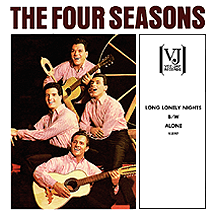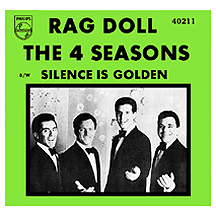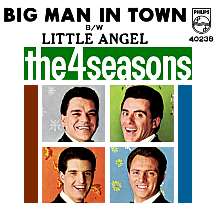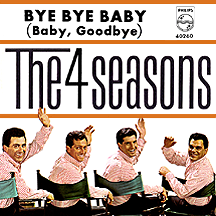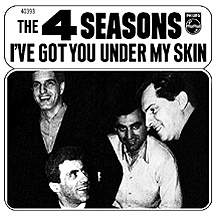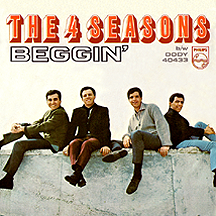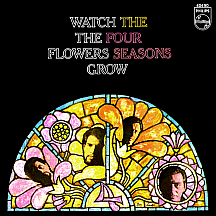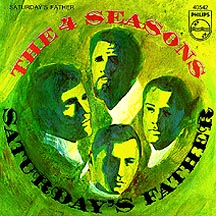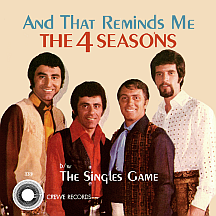THE 4 SEASONS
The 4 Seasons have a complicated history. They kept changing their game plan, not just during the lean years while attempting to establish themselves, but in successful times as well. The group's trial, error and readjustment period of the 1950s eventually resulted in the winning formula of lead singer Frankie Valli, multitalented Bob Gaudio (songwriting his specialty) and producer-songwriter Bob Crewe.
Valli, from Newark, New Jersey, had made a record as early as 1953. Born Francis Castelluccio, he discarded the idea of using his tongue-twisting given name, waxing "My Mother's Eyes" for the Corona label as Frank Valley. He was Frankie Valley on Mercury Records in 1954. In '58 and '59 he appeared on the Cindy label (with at least one future 4 Season) as Franke Valli and the Romans, on Okeh as Frankie Tyler (with "I Go Ape," not to be mistaken for the Neil Sedaka hit from around that time), and as Frankie Vally on Decca. There were other names, more difficult to pinpoint. For a short time in the midst of all the chaos, he had a hit single as the lead singer of The Four Lovers.
Gaudio, of nearby Bergenfield, New Jersey, had scored a hit when, at the age of 14, he and Tom Austin put together the group Royal Teens and wrote "Short Shorts" in honor of the cutoff jeans they noticed all the girls were wearing ('Man, dig those crazy chicks!'). The group ran its course in a couple of years' time and in 1960 Gaudio hooked up with the Four Lovers as singer, guitarist and sometime keyboard player.
Crewe, also from Newark, a onetime fashion model making his mark as a producer and songwriter, enjoyed considerable late-'50s success with The Rays' "Silhouettes" in '57, Billy and Lillie's "La Dee Dah" and "Lucky Ladybug" in '58 and '59 and Freddy Cannon's run of hits starting with "Tallahassee Lassie." Trying his hand as a singer, he released ""The Whiffenpoof Song" in 1960, but it wasn't his forte. By that time the Four Lovers were making a change, and Bob Crewe jumped on board for the long haul.
Jersey boy Tommy DeVito is another important part of the Seasons story. It was he who helped Frankie take a detour from his solo aspirations to go the way of the doo wop group. The Variatones were formed in 1955 (along with guitarist Hank Majewski and Tommy's Brother Nick DeVito) and switched to The Four Lovers within a year. They were picked up soon after by RCA Victor, landing on the charts in May 1956 with "You're the Apple of My Eye," written by Otis Blackwell, a frequent contributor to Elvis Presley's stockpile of hits. Valli tried more gimmicks over the next few years, but it was primarily as the Four Lovers that the guys performed for the rest of the decade.
By the early 1960s the Lovers were running on what little juice they could still squeeze out of "Apple of My Eye," since none of their follow-up singles on RCA and Epic had borne any further fruit. Majewski and Nick DeVito moved on. Gaudio and Charles Calello stepped in, but Charles left shortly after, though he would function for many years as a "Fifth Season" of sorts, arranging the music on many of the group's hits (usually credited on the labels as simply "Calello"). An old friend who'd been performing for several years with Newark-area groups, Nick Massi, joined up, and there were no further changes for several years. Bass player Massi, with a deep bass voice to match, would turn out to be an important part of the group's sound. When Massi quit around early 1966, Joe Long took his place on bass.
So the lineup that would one day reel us all in was set by 1961. Valli, DeVito, Gaudio and Massi had decided to abandon the Four Lovers name about that time and Crewe, who'd been producing their records for awhile, began collaborating on songs with Gaudio. The group had single releases on Crewe's Topix label as The Village Voices and Billy Dixon and the Topics, with additional aliases a possibility. They must have enjoyed the many, often bizarre, stage names; even after they were established as one of America's hottest acts, they released an absurdly high-pitched rendition of Bob Dylan's "Don't Think Twice" as The Wonder Who? (using the name after that for occasional novelty releases) and moonlighted as instrumental band The Valli Boys (on a solo Frankie Valli B-side). But it was in the early 1960s that they chose the maximum impact moniker. Reduced to auditioning for gigs in various dives, and after an unsuccessful tryout at a Jersey bowling alley called the Four Seasons, they took the name of the place as their own (perhaps as a reverse-luck tactic, much like betting on the number 13). The first release by The Four Seasons was "Bermuda" on Gone Records, and in keeping with the name of that label, the song went into the same void as all but the one Four Lovers disc had before.
As we all know, the story doesn't end there. Bob Gaudio wrote a song called "Sherry," and it actually took considerable effort to find a record company that would give it a chance. R&B label Vee-Jay, making an effort to expand into pop and rock, was that company. Did someone once say overnight success comes to those who wait? Well, if they didn't, I'm saying it now. Sporting a not-surprisingly numerically altered name on the label, The 4 Seasons, the record hit the charts the last week in August 1962, and just three weeks later the guys had the number one song from coast to coast. It was high production value doo wop, an undeniably catchy tune that went into hot rotation just about everywhere at the same time. "Sherry"'s impact was so swift and sure that it was obvious this would not be a one-shot thing.
Crewe and Gaudio were suddenly in a position to unleash their songs on a large, receptive audience, with Valli's falsetto contrasted with Massi's bass accents their outlet. They collaborated on "Big Girls Don't Cry," another chart-topper. These first two VJ singles spent ten of the last 16 weeks of 1962 at number one, and the group slipped in one additional top 40 before year's end, "Santa Claus is Coming to Town," the most over-the-top recording yet of a standard Christmas tune dating back to 1934. The following March, "Walk Like a Man," another Crewe-Gaudio track, took the Seasons to number one for the third time in less than six months. The writing team also came up with the 1963 hits "Soon (I'll Be Home Again)" and "Marlena," the flip side of the fourth top ten, "Candy Girl," written by Larry Santos. Other 1963 Seasons songs from outside sources included "Peanuts" (a 1957 hit for Little Joe and the Thrillers, penned by the group's lead singer Joe Cook), "Ain't That a Shame" (the Fats Domino-Dave Bartholomew classic) and "Stay" (a number one hit in 1960 by the song's composer, Maurice Williams, and his group The Zodiacs).
In late 1963, Crewe and Charles Calello came up with "New Mexican Rose," followed in early 1964 with Gaudio and Sandy Linzer's "Dawn (Go Away)," which had been recorded months earlier but was held back for release until the following year, as the band and Vee-Jay Records faced off in court over a royalty dispute. Vee-Jay had further problems at the time with Capitol Records, the two companies fighting over the rights to distribute records by The Beatles in the U.S. Since the majority of Capitol's stock had been sold to EMI (owners of the Beatles' label Parlophone) in 1955, Capitol easily gained control, and Vee-Jay went into a tailspin. The 4 Seasons were fortunate to get out of their contract, moving to Philips (a Mercury subsidiary). When "Dawn" finally got the green light in early 1964, it went right up against the onslaught of Beatlemania, holding at number three in February and March while the Fab Four were in the top two spots. Had the single been released a little earlier as planned, it likely would have been another number one hit for the group.
Besides writing with others, Crewe and Gaudio continued working together, turning out several big hits for the 4 Seasons over the next couple of years: "Ronnie," "Rag Doll" (the group's fourth number one) and "Save It For Me" in '64, and "Bye Bye Baby (Baby, Goodbye)," "Toy Soldier" and "Girl Come Running" in '65. Gaudio's first solo composition since "Sherry," "Big Man in Town," was a hit in between. One of the biggest of all 4 Seasons hits, "Let's Hang On" at the end of '65 was a collaboration between Crewe, Denny Randell and Linzer (scoring big with The Toys' "A Lover's Concerto" on Crewe's recently established DynoVoice label at about the same time, Linzer and Randell also came up big in 1966 with two more Seasons smashes, "Working My Way Back to You" and "Opus 17 (Don't You Worry 'Bout Me").
It was certainly good to be from New Jersey and a friend of one or all of the 4 Seasons in those nonstop hitmaking days of the '60s. Newark-area native Mike Petrillo, a friend of Frankie and the guys for several years, wrote a song with Angelo "Cubby" Cifelli, also from Newark and a former member of The Tradewinds (of fleeting "Furry Murray" fame in '59); "Tell It to the Rain" started 1967 with the Seasons in the top ten. Petrillo, an accomplished saxophonist, also played on some of the group's sessions. Jersey singer Peggy Santiglia of late-'50s girl group The Delicates and later The Angels (she sang lead on their number one '63 hit "My Boyfriend's Back"), by that time using the name Peggy Farina, teamed with Gaudio to write "Beggin'." Another Newark native, L. Russell Brown, along with Raymond Bloodworth, penned two Seasons hits, "C'mon Marianne" and "Watch the Flowers Grow." Petrillo and Linzer put their heads together in 1968 for "Electric Stories," one of the group's entries in the late '60s psychedelic sweepstakes. "I've Got You Under My Skin" (a Cole Porter song) and "Will You Love Me Tomorrow" (the earlier Shirelles smash written by Gerry Goffin and Carole King) were among the few remakes during this period. No matter the writer, suffice it to say that Valli and company delivered their lines expertly.
Frankie Valli never quite got over his yearning to be a solo star, despite the credit on every Philips label after "Dawn" directly below the 4 Seasons name: Featuring the "Sound" of Frankie Valli. Starting in 1966 with "(You're Gonna) Hurt Yourself" and riding high in summer '67 with "Can't Take My Eyes Off You," he finally felt the thrill of solo stardom...counting on the listeners overlooking that the songs were actually 4 Seasons recordings, with the decision of which would be released under Frankie's name made after the fact. In the 1970s he got the chance to make records without as much input from Crewe or the other Seasons, though they were usually in the vicinity during inception and/or recording. The group also was hot again in the '70s, returning after about a half-decade to the upper reaches of the charts. New members Don Ciccone (former member of The Critters) and Gerry Polci complemented Frankie on "Who Loves You" in '75 and December, 1963 (Oh, What a Night)" in '76.
But wait, I overlooked the Cuban Missile Crisis, didn't I? Anyone who listened to the radio a lot in late 1962 knows what I'm talking about. Certain things in life will stick with a person, and for me, "Big Girls Don't Cry" by The 4 Seasons and the fear that accompanied those menacing missiles in Cuba go together like bread and butter. That instant-smash second single had just hit the Los Angeles radio waves (and most everywhere else in the country) in mid-to-late October '62 and since Valli and company were the hottest act of the moment, it was getting frequent airplay; sometimes you would hear it twice an hour if you switched back and forth between KRLA and KFWB. In between there were news alerts about the missiles and how President John F. Kennedy was going to deal with the problem. Scary stuff, even moreso for a young kid like myself. JFK handled the situation admirably and the threat of nuclear war was averted when the missiles were removed a few weeks later. This, of course, is a matter of historical record. Human reactions are less tangible. Looking back I can embrace the mixed emotions, the joy and fear that's soaked into every second of several of the hits from that time..."Big Girls Don't Cry" more than any other, as it was neck-and-neck with those frightening news reports for the distinction of "most played."
NOTABLE SINGLES:
- You're the Apple of My Eye - 1956
as the Four Lovers - Bermuda - 1961
- Sherry - 1962
- Big Girls Don't Cry /
Connie-O - 1962 - Santa Claus is Coming to Town - 1962
- Walk Like a Man - 1963
- Peanuts - 1963
- Ain't That a Shame /
Soon (I'll Be Home Again) - 1963 - Candy Girl /
Marlena - 1963 - New Mexican Rose /
That's the Only Way - 1963 - Dawn (Go Away) - 1964
- Stay - 1964
- Ronnie - 1964
- Alone /
Long Lonely Nights - 1964 - Rag Doll /
Silence is Golden - 1964 - Save It For Me - 1964
- Sincerely - 1964
- Big Man in Town - 1964
- Bye Bye Baby (Baby, Goodbye) - 1965
- Toy Soldier - 1965
- Girl Come Running - 1965
- Let's Hang On - 1965
- Don't Think Twice - 1965
as the Wonder Who? - Working My Way Back to You - 1966
- Opus 17 (Don't You Worry 'Bout Me) - 1966
- On the Good Ship Lollipop /
You're Nobody Till Somebody Loves You - 1966
as the Wonder Who? - I've Got You Under My Skin - 1966
- Tell It to the Rain - 1966
- Beggin' - 1967
- C'mon Marianne - 1967
- Lonesome Road - 1967
as the Wonder Who? - Watch the Flowers Grow - 1967
- Will You Love Me Tomorrow - 1968
- Saturday's Father - 1968
- Electric Stories - 1969
- Something's on Her Mind /
Idaho - 1969 - And That Reminds Me (My Heart Reminds Me) - 1969
- Patch of Blue - 1970
as Frankie Valli and the 4 Seasons - Who Loves You - 1975
- December, 1963 (Oh, What a Night) - 1976
- Silver Star - 1976


